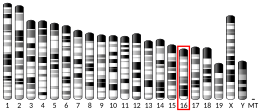Dopamine receptor D3 is a protein that in humans is encoded by the DRD3 gene.[5][6]
This gene encodes the D3 subtype of the dopamine receptor. The D3 subtype inhibits adenylyl cyclase through inhibitory G-proteins. This receptor is expressed in phylogenetically older regions of the brain, suggesting that this receptor plays a role in cognitive and emotional functions.[citation needed] It is a target for drugs which treat schizophrenia, drug addiction, and Parkinson's disease.[7] Alternative splicing of this gene results in multiple transcript variants that would encode different isoforms, although some variants may be subject to nonsense-mediated decay (NMD).[6]
- ^ a b c GRCh38: Ensembl release 89: ENSG00000151577 – Ensembl, May 2017
- ^ a b c GRCm38: Ensembl release 89: ENSMUSG00000022705 – Ensembl, May 2017
- ^ "Human PubMed Reference:". National Center for Biotechnology Information, U.S. National Library of Medicine.
- ^ "Mouse PubMed Reference:". National Center for Biotechnology Information, U.S. National Library of Medicine.
- ^ Le Coniat M, Sokoloff P, Hillion J, Martres MP, Giros B, Pilon C, et al. (September 1991). "Chromosomal localization of the human D3 dopamine receptor gene". Human Genetics. 87 (5): 618–620. doi:10.1007/bf00209024. PMID 1916765. S2CID 28411786.
- ^ a b "Entrez Gene: DRD3 dopamine receptor D3".
- ^ Joyce JN, Millan MJ (February 2007). "Dopamine D3 receptor agonists for protection and repair in Parkinson's disease". Current Opinion in Pharmacology. 7 (1): 100–105. doi:10.1016/j.coph.2006.11.004. PMID 17174156.






